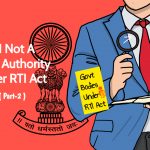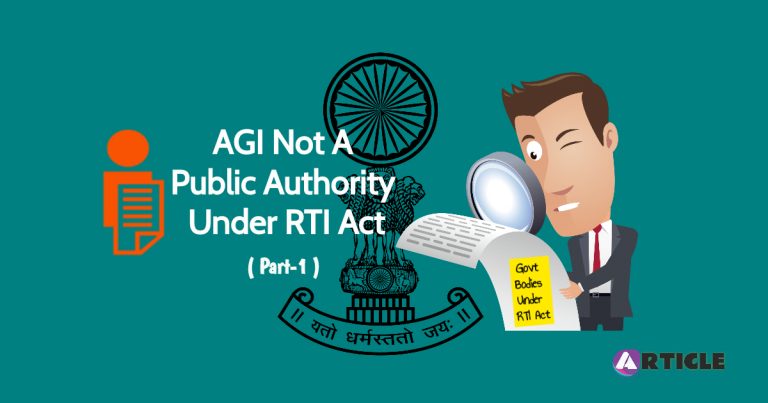The Article’s special series over questioning one of the key offices in the country, why does the AGI’s office stay away to come under the RTI Act?
Article 76 of the Constitution of India provides that the President shall appoint a person who is qualified to be appointed as a Judge of the Supreme Court to be Attorney General for India. It further stipulates that it shall be the duty of the Attorney General to give advice to the Government of India upon such legal matters, and to perform such other duties of a legal character, as may from time to time be referred or assigned to him by the President, and to discharge the functions conferred on him by or under this Constitution or any other law for the time being in force.
In general parlance, the Attorney General for India or abbreviated as AGI is the counsel for the Central government of India. He represents the Government of India in Courts. He has the right of audience in all Courts throughout the territory of India. Since the post of the AGI emanates directly from the Constitution of India, there have been legal debates in recent years that whether the AGI comes under the ambit of ‘Right to Information Act’ or not. In 2015, a single judge Bench of the High Court of Delhi ruled that the AGI is a ‘Public Authority’ under the ‘RTI Act’ but the division bench of the same High Court overturned the single Bench’s decision later on. Presently, the matter is pending before the Supreme Court of India for the final adjudication.
In this series of three articles, I am going to explain and examine the genesis of this legal altercation, the reasoning of the Single Bench in holding the AGI to be a ‘Public Authority’ and the reasoning of the division Bench in overturning the Single Bench’s decision. In this series of articles, I am also going to analyze what ought to be the correct position of law in my opinion. Here is the first part of this series:
The genesis of the legal altercation.
On November 15, 2011, a well-known RTI activist S.C Agrawal filed an RTI application in the office of the attorney general for India seeking certain Information under RTI. The office of the AGI declined to accept his application claiming that there is no CPIO in the office. Thereafter, he filed a complaint before the CIC, but the CIC through its decision dated December 10, 2012, held that the office of AGI is not a ‘Public authority’ as defined in section 2(h) of the RTI Act.
Another applicant named R.K Jain, made an application in the office of AGI dated January 7, 2013, seeking certain information under RTI, to which the office responded by claiming that, “as per the full bench decision of the CIC, the AGI is not a public authority.” It is after this denial that both of them filed a Writ Petition in the High Court of Delhi, praying to declare the AGI as a ‘Public authority’ and to direct the office to provide them the sought information.
The Single Bench Decision of the High Court of Delhi
This petition came to be heard before a single judge Bench of Justice Vibhu Bakhru in the High Court of Delhi. The learned judge, through his judgment dated 10th of March 2015, declared on the basis of sound legal reasoning that office of the Attorney General for India is a Public Authority under the ambit of RTI Act. In his judgment, the learned judge noted that:
“The office of the AGI is an office established under the Constitution of India. The incumbent appointed to that office discharges functions as provided under the Constitution. Article 76(2) of the Constitution expressly provides that the AGI would perform the duties of a legal character and also discharge the functions conferred on him under the Constitution or any other law in force,”
Immediately after that, a Division Bench of the High Court of Delhi stayed this single Bench judgment on an appeal filed by the Union law ministry and finally overturned this single bench decision through its judgment dated February 3, 2017, to exempt the Office of the Attorney General from the purview of ‘RTI Act’.
Later on, in March 2017, activist Subhas Chandra Agrawal filed a Special Leave Petition in the Supreme Court of India against the impugned judgment of the Division Bench of Delhi High Court. The matter is still pending before the Supreme Court of India.
The Single Bench’s reasoning
The petitioners primarily relied upon the contentions that the office of the AGI is established by the Constitution of India by virtue of Article 76, and therefore is answerable to the people of India. It was also contended that the AGI also has certain other privileges and functions; under Article 88 of the Constitution. For instance, he has the right to take part in the proceedings of the Parliament and he also performs certain statutory duties under the Contempt of Courts Act, 1971.
It was contended on behalf of the respondent that the functions performed by the AGI neither alter the rights of any person nor bind the Government of India; therefore, the AGI could not be construed as an “Authority”. It was further argued that the AGI does not have the necessary infrastructure to support the applicability of the RTI Act inasmuch as, the AGI is a single person office and, therefore, would have to act as a CPIO as well as the Appellate Authority. Since the same is not feasible, the AGI cannot be held as ‘Public Authority’.
The single judge Bench of Justice Vibhu Bhakhru held that the opening sentence of section 2(h) of the Act cannot be interpreted in a restrictive sense. The expression ‘Authority’ would also include all persons or bodies that have been conferred a power to perform the functions entrusted to them. Merely because the bulk of the duties of the AGI are advisory, the same would not render the office of the AGI any less authoritative than other constitutional functionaries. The judge also opined that reference to the definition of authority under Article 12 of the Constitution is not necessary for determining the scope of Section 2(h) of the RTI Act. An office that is established under the Constitution of India would clearly fall within the definition of Section 2(h) of the RTI Act.
Further, read more in next versions.



